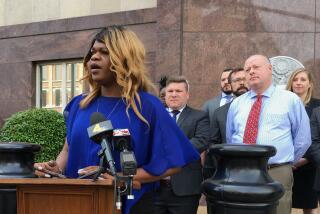Chinese parents win custody
- Share via
ATLANTA — The Tennessee Supreme Court ruled Tuesday that a Chinese immigrant couple should be reunited with their daughter almost eight years after she was placed in foster care with an American family.
In a case that has prompted fierce debate about ethnic and cultural bias in the U.S. judicial system, the state high court unanimously overturned a 2004 decision by a Memphis judge who removed the parental rights of Jack and Casey He. The court ruled that the couple did not willfully abandon Anna Mae, and that they were penalized because of their financial disadvantages and misunderstanding of the American legal system.
Jerry and Louise Baker, a white suburban couple who have cared for Anna Mae since she was 3 weeks old, have been ordered to give the girl up within 12 days.
The He family is ecstatic at the prospect of being reunited with Anna Mae, whom they have not seen for nearly four years. Jack He said her younger siblings -- a girl and a boy -- could not wait to teach their sister Chinese.
“She will wake up every morning to see all Chinese faces surrounding her,” he said. “Her mommy’s face, her daddy’s face, her brother’s face, her sister’s face. Finally, with Chinese faces all around her, she will have a permanent, peaceful mind.”
For most of Anna Mae’s life, the Hes and the Bakers have been locked in a battle over who should have custody. The Hes, who are illegal immigrants, say they sent Anna Mae to live with the Bakers only temporarily because of legal and financial hardships. The Bakers say that they can provide Anna Mae with more opportunities in the U.S. and that she has no connection to her biological parents.
Larry Parrish, the Bakers’ attorney, said the Bakers were “grieving” over the Supreme Court decision but planned to tell Anna Mae on Tuesday evening. “Until now, she has refused to talk about it,” he said. “Every attempt to talk about it, she goes running under her bed.”
After the ruling, Jack He said he would give the Bakers, whom he called “good Christians,” ample opportunity to visit Anna Mae. “We have no hatred for the Bakers at all,” he said.
In a 20-page opinion, Chief Justice William M. Barker of the Tennessee Supreme Court concluded that the evidence “overwhelmingly showed” that the Hes relinquished custody as a temporary measure.
Any evidence that Anna Mae would be harmed by a change in custody because she had grown attached to the Bakers, he wrote, would not constitute sufficient “substantial harm” to prevent the Hes from regaining custody. “Financial advantage and affluent surroundings simply may not be a consideration in determining a custody dispute between a parent and a nonparent,” Barker wrote.
Anna Mae was born in January 1999, shortly after her father, a doctoral student at the University of Memphis, was charged with sexually assaulting another student. He was subsequently acquitted of the charges, but in the meantime he lost his job, his stipend and his student visa.
Unable to afford to provide for Anna Mae, her mother and father arranged 90-day foster-care placement with the Bakers. When the term ended, both couples agreed to continue the arrangement, and Anna Mae’s parents signed papers granting the Bakers custody.
But before Anna Mae’s second birthday, there was disagreement: Her biological parents said they thought the Bakers were taking care of her temporarily; the Bakers said they had been asked to raise Anna Mae until she was an adult.
In 2004, Circuit Judge Robert Childers terminated the Hes’ parental rights on the grounds of willful abandonment.
Some have argued that Childers was improperly swayed by cultural bias. In his ruling, he described the Hes as calculating people whose fight for their daughter was motivated by fear of deportation. He also suggested that Anna Mae’s life would be at risk if the Hes took her back to China, citing a high infant mortality rate for girls and the country’s one-child rule.
The case was monitored by the Chinese Embassy in Washington, and legal experts from across the country submitted briefs arguing that Childers was wrong to compare the parenting skills or affluence of the two sets of parents.
“The idea that one country or one culture has a better living style -- that should never have any part in a custody decision,” said Bruce Boyer, director of the Loyola ChildLaw Clinic in Chicago, who cowrote an amicus brief in the case.
On Tuesday, news of the Supreme Court’s decision reverberated across Tennessee, where Asian community activists had rallied in support of the Hes.
“What a victory for immigrants and for all people who don’t have resources,” said Khun-Bok Ahn, an Asian community leader in Memphis who attended court sessions in support of the Hes. “Justice has been served.”
The ruling sends the case back to Shelby County Juvenile Court, with the order that it complete the transfer of Anna Mae to her biological parents within 12 days.
The Bakers’ attorney said the couple remained hopeful. They have 10 days to challenge the ruling at the federal level.
“The Hes have complete control; they definitely have the controlling card right now,” Parrish said. “But the Bakers are strong people, and they haven’t lost their faith that everyone can keep Anna Mae’s best interest at heart.”
*
More to Read
Sign up for Essential California
The most important California stories and recommendations in your inbox every morning.
You may occasionally receive promotional content from the Los Angeles Times.











